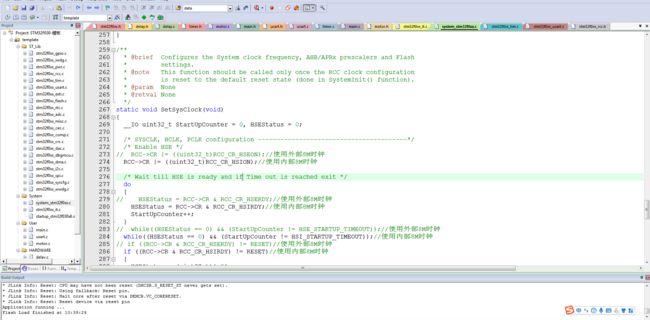- STM32中的计时与延时
lupinjia
STM32stm32单片机
前言在裸机开发中,延时作为一种规定循环周期的方式经常被使用,其中尤以HAL库官方提供的HAL_Delay为甚。刚入门的小白可能会觉得既然有官方提供的延时函数,而且精度也还挺好,为什么不用呢?实际上HAL_Delay中有不少坑,而这些也只是HAL库中无数坑的其中一些。想从坑里跳出来还是得加强外设原理的学习和理解,切不可只依赖HAL库。除了延时之外,我们在开发中有时也会想要确定某段程序的耗时,这就需要
- 基于STM32与Qt的自动平衡机器人:从控制到人机交互的的详细设计流程
极客小张
stm32qt机器人物联网人机交互毕业设计c语言
一、项目概述目标和用途本项目旨在开发一款基于STM32控制的自动平衡机器人,结合步进电机和陀螺仪传感器,实现对平衡机器人的精确控制。该机器人可以用于教育、科研、娱乐等多个领域,帮助用户了解自动控制、机器人运动学等相关知识。技术栈关键词STM32单片机步进电机陀螺仪传感器AD采集电路Qt人机界面实时数据监控二、系统架构系统架构设计本项目的系统架构设计包括以下主要组件:控制单元:STM32单片机传感器
- 基于STM32的汽车仪表显示系统:集成CAN、UART与I2C总线设计流程
极客小张
stm32汽车嵌入式硬件物联网单片机c语言
一、项目概述项目目标与用途本项目旨在设计和实现一个基于STM32微控制器的汽车仪表显示系统。该系统能够实时显示汽车的速度、转速、油量等关键信息,并通过CAN总线与其他汽车控制单元进行通信。这种仪表显示系统不仅提高了驾驶的安全性和便捷性,还能为汽车提供更智能的用户体验。技术栈关键词微控制器:STM32显示技术:TFTLCD/OLED传感器:速度传感器、温度传感器、油量传感器通信协议:CAN总线、UA
- 51单片机——I2C总线存储器24C02的应用
老侯(Old monkey)
51单片机嵌入式硬件单片机
目标实现功能单片机先向24C02写入256个字节的数据,再从24C02中一次读取2个字节的数据、并在数码管上动态显示,直至读完24C02中256个字节的数据。1.I2C总线简介I2C总线有两根双向的信号线,一根是数据线SDA,另一根是时钟线SCL。I2C总线通过上拉电阻接正电源,因此,当总线空闲时为高电平。2.I2C通信协议起始信号、停止信号由主机发出。在数据传送时,当时钟线为高电平时,数据线上的
- 嵌入式单片机中数码管基本实现方法
嵌入式开发星球
单片机项目实战操作之优秀单片机
1.点亮数码管本节课利用已经学习的LED知识去控制一个8位数码管。本节的原理比较简单。不需要多少时间讲。更多时间是跟大家一起编码调试,从中学习一些编码思路和学习方法。1.1.什么是数码管数码管是什么?下图就是一个数码管从硬件上个看,其实就是8个LED组合在一起。8个LED应该有16个引脚,但是数码管上只有10个引脚。为什么呢?请看下图:1个LED有两个引脚,要控制LED,1个引脚接控制信号,另外一
- 基于STM32的简易RTOS分析-预备知识
騏威
嵌入式
写下这篇文章的主要目的是对自己学习RTOS的历程做一个记录和总结,方便以后回忆翻看。以下内容主要来自宋岩先生翻译的《Cortex-M3权威指南》。目录一、Cortex-M3寄存器简介二、堆栈操作简介三、汇编指令简介LDR和STR指令STMDB和LDMIA指令B、BX、BL、BLX指令MRS和MSR指令四、中断简介中断响应过程简介SVC和PensSV中断简介软件中断五、汇编基础一、Cortex-M3
- 15-自编写rtos-结合stm32实际调试(ladylolo-os)
Ladylolo-lsm
stm32嵌入式硬件单片机
一、任务调度:1.理解:任务切换,用堆栈指针SP保存即将要切换的任务的前后文,然后是用PendSV来执行这些操作的;由于是基于优先级的调度策略,所以每次“心跳”都会看有没有优先级更高的出现,如果有就用PendSV进行上下文切换。2.编写部分:①每个任务自己的属性统称为TCB任务控制块。②任务就绪表有设置优先级(设置的时候变量或上优先级的变量让某个位数等于1),从任务就绪表中删除(删除时用与来得等于
- 小米嵌入式面试题目RTOS面试题目 嵌入式面试题目
好家伙VCC
面试杂谈杂谈面试职场和发展
第一章-非RTOSbootloader工作流程MCU启动流程通信协议,SPIIICMCU怎么选型,STM32F1和F4有什么区别外部RAM和内部RAM区别,怎么分配外部总线和内部总线区别MCU上的固件,数据是怎么分配的MCU启动流程IAP是怎么升级的,突然断电怎么办挑了麦轮项目(因为大疆RM也是麦轮,面试官看样子比较感兴趣)为什么用的CAN总线你说一下spi和i2c和UART的各自的工作方式优缺点
- 基于STM32F103C8T6定时器的PWM通道的重映射
—你的鼬先生
stm32嵌入式硬件单片机
在我们平时的的使用中,我们最常使用的是TIM2和TIM3的PWM通道,但是由于C8T6的IO口有限,所以可能会出现PWM通道的资源不够的情况,从而我们可能会使用PWM4的PWM通道,但是TIM4的PWM通道并不能直接使用,它需要进行一个重映射,不然可能会导致PWM波不能正常发送。以下就是对PWM4的PWM通道进行一个重映射#include"stm32f10x.h"//Deviceheadervoi
- 【STM32系统】基于STM32设计的锂电池电量/电压检测报警器系统——文末完整资料下载(程序源码/电路原理图/电路PCB/设计文档/模块资料/元器件清单/实物图/答辩问题技巧/PPT模版等)
阿齐Archie
单片机嵌入式项目stm32嵌入式硬件单片机
基于STM32设计的锂电池电量/电压检测报警器系统系统视频:摘要:本设计旨在研究一个基于STM32F103C8T6微控制器的锂电池电量/电压检测报警器系统,应用于便携式电子设备电池管理。系统通过STM32的ADC模块对锂电池电压进行采集,利用LCD1602显示模块实时显示电池电压,当检测到电池电量不足或电压异常时,蜂鸣器报警模块会发出警报提醒用户。系统采用简单的硬件结构和优化的软件架构,通过对实际
- 使用STM32实现简单的智能温控系统
棂梓知识
stm32单片机嵌入式硬件
智能温控系统是一种能够根据环境温度实时调整设备的工作状态的系统。在本篇文章中,我们将使用STM32微控制器来实现一个简单的智能温控系统。该系统将会有以下功能:实时监测环境温度,并显示在LCD屏幕上。当环境温度超过设定的阈值时,自动开启风扇。当环境温度恢复正常时,自动关闭风扇。通过按键模拟调节设定的阈值。系统设计首先,我们需要准备一些硬件设备。具体而言,我们需要以下组件:STM32F103C8T6开
- STM32 HAL freertos零基础(九)任务通知
啥也不会的小白研究生
零基础学习Freertosstm32嵌入式硬件单片机
1、任务通知任务通知用于任务之间同步和通信。任务通知允许一个任务向另一个任务发送一个32位的值,并可以选择是否唤醒正在等待通知的任务。这使得任务之间的同步更加简单和灵活。任务通知功能:发送通知:一个任务可以向另一个任务发送一个32位的值。接收通知:接收任务可以根据接收到的通知来决定何时执行某些操作。通知状态:可以检查任务的当前通知状态。2、相关APIxTaskNotify()//发送通知,带有通知
- 4×4矩阵键盘详解(STM32)
辰哥单片机设计
STM32传感器教学矩阵计算机外设stm32嵌入式硬件单片机传感器
目录一、介绍二、传感器原理1.原理图2.工作原理介绍三、程序设计main.c文件button4_4.h文件button4_4.c文件四、实验效果五、资料获取项目分享一、介绍矩阵键盘,又称为行列式键盘,是用4条I/O线作为行线,4条I/O线作为列线组成的键盘。在行线和列线的每一个交叉点上设置一个按键,因此键盘中按键的个数是4×4个。这种行列式键盘结构能够有效地提高单片机系统中I/O口的利用率,节约单
- STM32的寄存器深度解析
千千道
STM32stm32单片机物联网
目录一、STM32寄存器概述二、寄存器的定义与作用三、寄存器分类1.内核寄存器2.外设寄存器四、重要寄存器详解1.GPIO相关寄存器2.定时器相关寄存器3.中断相关寄存器4.RCC相关寄存器五、寄存器操作方法1.直接操作寄存器2.使用库函数操作寄存器六、总结在嵌入式系统开发中,STM32微控制器以其强大的性能和丰富的功能而备受青睐。而理解和掌握STM32的寄存器是深入学习和开发STM32的关键。本
- STM32 如何生成随机数
千千道
STM32stm32单片机物联网
目录一、引言二、STM32随机数发生器概述三、工作原理1.噪声源2.线性反馈移位寄存器(LFSR)3.数据寄存器(RNG_DR)4.监控和检测电路:5.控制和状态寄存器6.生成流程四、使用方法1.使能随机数发生器2.读取随机数3.错误处理五、注意事项1.随机数的质量2.安全性3.性能考虑六、总结一、引言在嵌入式系统开发中,随机数的生成常常是一个重要的需求。无论是用于加密、模拟、游戏还是其他需要不确
- STM32——看门狗通俗解析
百里与司空
stm32嵌入式硬件单片机门控循环单元
笔者在学习看门狗的视频后,对看门狗仍然是一知半解,后面在实际应用中发现它是一个很好用的检测或者调试工具。所以总结一下笔者作为初学小白对看门狗的理解。主函数初始化阶段、循环阶段和复位众所周知,程序的运行一般是这样的:程序在进入循环阶段之前,会在初始化阶段将每个寄存器或者某些变量赋值。初始化阶段的代码执行一次后,就不再执行了。而循环阶段的代码会执行很多次,一直循环反复的执行下去。这时,如果进行了复位,
- STM32 的 RTC(实时时钟)详解
千千道
STM32stm32物联网单片机
目录一、引言二、RTC概述三、RTC的工作原理1.时钟源2.计数器3.闹钟功能4.备份寄存器四、RTC寄存器1.RTC_TR(TimeRegister,时间寄存器)2.RTC_DR(DateRegister,日期寄存器)3.RTC_SSR(SubsecondRegister,亚秒寄存器)4.RTC_PRER(PrescalerRegister,预分频器寄存器)5.RTC_CR(ControlReg
- 学单片机怎么在3-5个月内找到工作?
无际单片机编程
单片机嵌入式开发物联网stm32c语言
每个初学者,都如履薄冰,10几年前,我自学单片机时,也一样。想通过学习,找一份体面点的工作,又害怕辛辛苦苦学出来,找不到工作。好在,当初执行力,还算可以,自学java没成功,后面自学单片机,成功入行了。转眼间,毕业到现在有13年了,马上也到了奔4的年纪。这13年一直在跟单片机打交道,打过工,创过业,对行业,对企业,都有一定的认知,坚持看完这篇内容,相信能帮你少走几个月弯路。有些老铁,加了我很久,时
- 51单片机:P3.3口输入/P 1口输出实验
li星野
单片机
51单片机:P3.3口输入/P1口输出实验一、实验内容1P3.3口做输入口,外接一脉冲,每输入一个脉冲,P1口按十六进制除2(乘2)。2.P1口做输出口,P1口接的8个发光二极管L1—L8按十六进制除2(乘2)方式点亮。二、仿真图三、代码实现C语言实现:#include#includesbitKEY=P3^3;voiddelay10ms(void);voidmain(){charnum=0xfe;
- 2020-11-12 写单片机内存的脚本 nc openocd 事务自动测试
linuxScripter
这是写单片机内存的脚本:z@z-ThinkPad-T400:~/zworkT400/EDA_heiche/zREPOgit/simple-gcc-stm32-project$catz.wholeRun.oneCase.cmdcattmp6.toWrite|awk'{system("echomwb"$1""$2"|nclocalhost4444");}'catUSER/DEBUG/debug.h|g
- 单片机中断
woainizhongguo.
STM32单片机原理解析篇单片机嵌入式硬件
**在51单片机中,中断向量表的地址是如何被设置的?**在51单片机中,中断向量表的设置是中断系统的核心部分,它定义了中断服务程序的入口地址。以下是中断向量表的设置方法:中断向量表的位置:51单片机的中断向量表通常位于程序存储器的起始位置,即地址0x0000到0x000F(对于双字节的中断向量,实际占用0x0000到0x001F)。这些地址是固定的,由单片机的硬件设计决定。中断向量的分配:每个中断
- arm-none-eabi-gcc 不识别__attribute__((at(xxx))命令如何将数据定义到外部SDAM(已验证)
梓默
#C
提示:文章写完后,目录可以自动生成,如何生成可参考右边的帮助文档文章目录可以利用__attribute__((section(".xxx")))实现同样的效果步骤:1.在linker链接文件中添加指定SDRAM加偏移地址2.添加SDRAM自定义section3.将数据定义到自定义区可以利用__attribute__((section(".xxx")))实现同样的效果步骤:从STM32H7xx参考手
- 基于STC12C5A60S2单片机的LED汉字显示系统的设计
lantiandianzi
单片机嵌入式硬件
本设计基于单片机的LED汉字显示装置,该设计以STC12C5A60S2单片机为核心,利用最小系统和多个模块完成设计,包括点阵驱动模块、时钟模块、串口通信模块、红外线接收模块以及LED点阵屏。其中,点阵驱动模块采用74HC245芯片设计完成,结合DS1302时钟芯片完成LED点阵显示屏的汉字与时间显示,使用按键、串口、红外线遥控可以完成时间的实时更新、自定义汉字显示、改变汉字显示颜色、改变汉字滚动方
- 51单片机-AT24C02-实验2-秒表实验(可参考上一节)
Whappy001
51单片机嵌入式硬件单片机
利用定时器去对按键和数码管进行扫描(Whappy)main.c#include#include"LCD1602.h"#include"AT24C02.h"#include"Delay.h"#include"Timer0.h"#include"Nixie.h"#include"Key.h"unsignedcharKeyNum;unsignedcharMin,Sec,MiniSec;unsignedc
- 单片机在医疗设备中的应用实例教程
kkchenjj
单片机单片机嵌入式硬件
单片机在医疗设备中的应用实例教程单片机基础单片机概述单片机,全称为单片微型计算机(Single-ChipMicrocomputer),是一种将中央处理器(CPU)、存储器、输入输出接口等主要计算机部件集成在一块芯片上的微型计算机系统。它具有体积小、功耗低、成本低廉、控制功能强大等特点,广泛应用于工业控制、家用电器、汽车电子、医疗设备等多个领域。特点集成度高:单片机将计算机的主要部件集成在一块芯片上
- 单片机与传感器接口技术应用实例教程
kkchenjj
单片机单片机nosql嵌入式硬件
单片机与传感器接口技术应用实例教程单片机基础单片机概述单片机,全称为单片微型计算机(Single-ChipMicrocomputer),是一种将中央处理器(CPU)、存储器、输入输出接口等主要计算机部件集成在一块芯片上的微型计算机系统。它具有体积小、功耗低、成本低廉、控制功能强大等特点,广泛应用于工业控制、家用电器、汽车电子、通信设备、医疗器械等领域。特点集成度高:单片机将计算机的主要部件集成在一
- Error: No STM32 target found! If your product embeds Debug Authentication, please perform a discover
BABA8891
stm32嵌入式硬件单片机
这个错误信息“Error:NoSTM32targetfound!IfyourproductembedsDebugAuthentication,pleaseperformadiscoveryusingDebugAuthentication”通常出现在使用STM32微控制器的开发过程中,尤其是在尝试通过调试接口(如SWD或JTAG)与设备通信时。这个错误表明调试器或开发工具无法识别或连接到STM32目
- 掌握单片机,其实并不难
培林将军
单片机嵌入式硬件
Fearwillbeyourenemy恐惧将会是你的敌人单片机的学习绝不仅仅是对一项知识的掌握。想要学好单片机,需要从硬件结构、内部资源、外设应用等几个方面多方位入手。而要想成为一名嵌入式工程师,就要对单片机的基础非常熟悉,并且掌握C语言当中各个功能的初始化、启动、停止各类函数的编写调试。那么想要掌握单片机需要从哪几个方面入手呢?数字I/O的应用在大多数的单片机实验中,跑马灯实验正是数字I/O的典
- STM32与ESP8266的使用
每天的积累
嵌入式学习日记stm32stm32单片机嵌入式硬件
串口透传“透传”通常指的是数据的透明传输,意思是在不对数据进行任何处理或修改的情况下,将数据从一个接口转发到另一个接口。值得注意的是要避免串口之间无限制的透明,可以采用互斥锁的方式进行限制使用方法对USART1和USART3(用他俩举例)的模式都是设置为Asynchronous,并开启对应的中断。RCC的HighSPeedCLock模式设置为Crystal/Ceramic配置对应的时钟为64Mhz
- ARM-Cortex-M架构:1、STM32函数参数传递
天城寺电子
嵌入式软件开发arm开发stm32汇编C语言
文章目录参数传递概览堆栈传递参数具体过程参数传递概览在调用子函数时,ARMCortex-M3处理器可以使用寄存器和堆栈来传递参数。具体使用哪种方式取决于传递的参数数量和调用约定(callingconvention)。参数传递方式ARMCortex-M3处理器使用ARMEABI(EmbeddedApplicationBinaryInterface)标准来定义参数传递的约定。根据这个约定:1、寄存器传
- windows下源码安装golang
616050468
golang安装golang环境windows
系统: 64位win7, 开发环境:sublime text 2, go版本: 1.4.1
1. 安装前准备(gcc, gdb, git)
golang在64位系
- redis批量删除带空格的key
bylijinnan
redis
redis批量删除的通常做法:
redis-cli keys "blacklist*" | xargs redis-cli del
上面的命令在key的前后没有空格时是可以的,但有空格就不行了:
$redis-cli keys "blacklist*"
1) "blacklist:12:
[email protected]
- oracle正则表达式的用法
0624chenhong
oracle正则表达式
方括号表达示
方括号表达式
描述
[[:alnum:]]
字母和数字混合的字符
[[:alpha:]]
字母字符
[[:cntrl:]]
控制字符
[[:digit:]]
数字字符
[[:graph:]]
图像字符
[[:lower:]]
小写字母字符
[[:print:]]
打印字符
[[:punct:]]
标点符号字符
[[:space:]]
- 2048源码(核心算法有,缺少几个anctionbar,以后补上)
不懂事的小屁孩
2048
2048游戏基本上有四部分组成,
1:主activity,包含游戏块的16个方格,上面统计分数的模块
2:底下的gridview,监听上下左右的滑动,进行事件处理,
3:每一个卡片,里面的内容很简单,只有一个text,记录显示的数字
4:Actionbar,是游戏用重新开始,设置等功能(这个在底下可以下载的代码里面还没有实现)
写代码的流程
1:设计游戏的布局,基本是两块,上面是分
- jquery内部链式调用机理
换个号韩国红果果
JavaScriptjquery
只需要在调用该对象合适(比如下列的setStyles)的方法后让该方法返回该对象(通过this 因为一旦一个函数称为一个对象方法的话那么在这个方法内部this(结合下面的setStyles)指向这个对象)
function create(type){
var element=document.createElement(type);
//this=element;
- 你订酒店时的每一次点击 背后都是NoSQL和云计算
蓝儿唯美
NoSQL
全球最大的在线旅游公司Expedia旗下的酒店预订公司,它运营着89个网站,跨越68个国家,三年前开始实验公有云,以求让客户在预订网站上查询假期酒店时得到更快的信息获取体验。
云端本身是用于驱动网站的部分小功能的,如搜索框的自动推荐功能,还能保证处理Hotels.com服务的季节性需求高峰整体储能。
Hotels.com的首席技术官Thierry Bedos上个月在伦敦参加“2015 Clou
- java笔记1
a-john
java
1,面向对象程序设计(Object-oriented Propramming,OOP):java就是一种面向对象程序设计。
2,对象:我们将问题空间中的元素及其在解空间中的表示称为“对象”。简单来说,对象是某个类型的实例。比如狗是一个类型,哈士奇可以是狗的一个实例,也就是对象。
3,面向对象程序设计方式的特性:
3.1 万物皆为对象。
- C语言 sizeof和strlen之间的那些事 C/C++软件开发求职面试题 必备考点(一)
aijuans
C/C++求职面试必备考点
找工作在即,以后决定每天至少写一个知识点,主要是记录,逼迫自己动手、总结加深印象。当然如果能有一言半语让他人收益,后学幸运之至也。如有错误,还希望大家帮忙指出来。感激不尽。
后学保证每个写出来的结果都是自己在电脑上亲自跑过的,咱人笨,以前学的也半吊子。很多时候只能靠运行出来的结果再反过来
- 程序员写代码时就不要管需求了吗?
asia007
程序员不能一味跟需求走
编程也有2年了,刚开始不懂的什么都跟需求走,需求是怎样就用代码实现就行,也不管这个需求是否合理,是否为较好的用户体验。当然刚开始编程都会这样,但是如果有了2年以上的工作经验的程序员只知道一味写代码,而不在写的过程中思考一下这个需求是否合理,那么,我想这个程序员就只能一辈写敲敲代码了。
我的技术不是很好,但是就不代
- Activity的四种启动模式
百合不是茶
android栈模式启动Activity的标准模式启动栈顶模式启动单例模式启动
android界面的操作就是很多个activity之间的切换,启动模式决定启动的activity的生命周期 ;
启动模式xml中配置
<activity android:name=".MainActivity" android:launchMode="standard&quo
- Spring中@Autowired标签与@Resource标签的区别
bijian1013
javaspring@Resource@Autowired@Qualifier
Spring不但支持自己定义的@Autowired注解,还支持由JSR-250规范定义的几个注解,如:@Resource、 @PostConstruct及@PreDestroy。
1. @Autowired @Autowired是Spring 提供的,需导入 Package:org.springframewo
- Changes Between SOAP 1.1 and SOAP 1.2
sunjing
ChangesEnableSOAP 1.1SOAP 1.2
JAX-WS
SOAP Version 1.2 Part 0: Primer (Second Edition)
SOAP Version 1.2 Part 1: Messaging Framework (Second Edition)
SOAP Version 1.2 Part 2: Adjuncts (Second Edition)
Which style of WSDL
- 【Hadoop二】Hadoop常用命令
bit1129
hadoop
以Hadoop运行Hadoop自带的wordcount为例,
hadoop脚本位于/home/hadoop/hadoop-2.5.2/bin/hadoop,需要说明的是,这些命令的使用必须在Hadoop已经运行的情况下才能执行
Hadoop HDFS相关命令
hadoop fs -ls
列出HDFS文件系统的第一级文件和第一级
- java异常处理(初级)
白糖_
javaDAOspring虚拟机Ajax
从学习到现在从事java开发一年多了,个人觉得对java只了解皮毛,很多东西都是用到再去慢慢学习,编程真的是一项艺术,要完成一段好的代码,需要懂得很多。
最近项目经理让我负责一个组件开发,框架都由自己搭建,最让我头疼的是异常处理,我看了一些网上的源码,发现他们对异常的处理不是很重视,研究了很久都没有找到很好的解决方案。后来有幸看到一个200W美元的项目部分源码,通过他们对异常处理的解决方案,我终
- 记录整理-工作问题
braveCS
工作
1)那位同学还是CSV文件默认Excel打开看不到全部结果。以为是没写进去。同学甲说文件应该不分大小。后来log一下原来是有写进去。只是Excel有行数限制。那位同学进步好快啊。
2)今天同学说写文件的时候提示jvm的内存溢出。我马上反应说那就改一下jvm的内存大小。同学说改用分批处理了。果然想问题还是有局限性。改jvm内存大小只能暂时地解决问题,以后要是写更大的文件还是得改内存。想问题要长远啊
- org.apache.tools.zip实现文件的压缩和解压,支持中文
bylijinnan
apache
刚开始用java.util.Zip,发现不支持中文(网上有修改的方法,但比较麻烦)
后改用org.apache.tools.zip
org.apache.tools.zip的使用网上有更简单的例子
下面的程序根据实际需求,实现了压缩指定目录下指定文件的方法
import java.io.BufferedReader;
import java.io.BufferedWrit
- 读书笔记-4
chengxuyuancsdn
读书笔记
1、JSTL 核心标签库标签
2、避免SQL注入
3、字符串逆转方法
4、字符串比较compareTo
5、字符串替换replace
6、分拆字符串
1、JSTL 核心标签库标签共有13个,
学习资料:http://www.cnblogs.com/lihuiyy/archive/2012/02/24/2366806.html
功能上分为4类:
(1)表达式控制标签:out
- [物理与电子]半导体教材的一个小问题
comsci
问题
各种模拟电子和数字电子教材中都有这个词汇-空穴
书中对这个词汇的解释是; 当电子脱离共价键的束缚成为自由电子之后,共价键中就留下一个空位,这个空位叫做空穴
我现在回过头翻大学时候的教材,觉得这个
- Flashback Database --闪回数据库
daizj
oracle闪回数据库
Flashback 技术是以Undo segment中的内容为基础的, 因此受限于UNDO_RETENTON参数。要使用flashback 的特性,必须启用自动撤销管理表空间。
在Oracle 10g中, Flash back家族分为以下成员: Flashback Database, Flashback Drop,Flashback Query(分Flashback Query,Flashbac
- 简单排序:插入排序
dieslrae
插入排序
public void insertSort(int[] array){
int temp;
for(int i=1;i<array.length;i++){
temp = array[i];
for(int k=i-1;k>=0;k--)
- C语言学习六指针小示例、一维数组名含义,定义一个函数输出数组的内容
dcj3sjt126com
c
# include <stdio.h>
int main(void)
{
int * p; //等价于 int *p 也等价于 int* p;
int i = 5;
char ch = 'A';
//p = 5; //error
//p = &ch; //error
//p = ch; //error
p = &i; //
- centos下php redis扩展的安装配置3种方法
dcj3sjt126com
redis
方法一
1.下载php redis扩展包 代码如下 复制代码
#wget http://redis.googlecode.com/files/redis-2.4.4.tar.gz
2 tar -zxvf 解压压缩包,cd /扩展包 (进入扩展包然后 运行phpize 一下是我环境中phpize的目录,/usr/local/php/bin/phpize (一定要
- 线程池(Executors)
shuizhaosi888
线程池
在java类库中,任务执行的主要抽象不是Thread,而是Executor,将任务的提交过程和执行过程解耦
public interface Executor {
void execute(Runnable command);
}
public class RunMain implements Executor{
@Override
pub
- openstack 快速安装笔记
haoningabc
openstack
前提是要配置好yum源
版本icehouse,操作系统redhat6.5
最简化安装,不要cinder和swift
三个节点
172 control节点keystone glance horizon
173 compute节点nova
173 network节点neutron
control
/etc/sysctl.conf
net.ipv4.ip_forward =
- 从c面向对象的实现理解c++的对象(二)
jimmee
C++面向对象虚函数
1. 类就可以看作一个struct,类的方法,可以理解为通过函数指针的方式实现的,类对象分配内存时,只分配成员变量的,函数指针并不需要分配额外的内存保存地址。
2. c++中类的构造函数,就是进行内存分配(malloc),调用构造函数
3. c++中类的析构函数,就时回收内存(free)
4. c++是基于栈和全局数据分配内存的,如果是一个方法内创建的对象,就直接在栈上分配内存了。
专门在
- 如何让那个一个div可以拖动
lingfeng520240
html
<!DOCTYPE html PUBLIC "-//W3C//DTD XHTML 1.0 Transitional//EN" "http://www.w3.org/TR/xhtml1/DTD/xhtml1-transitional.dtd">
<html xmlns="http://www.w3.org/1999/xhtml
- 第10章 高级事件(中)
onestopweb
事件
index.html
<!DOCTYPE html PUBLIC "-//W3C//DTD XHTML 1.0 Transitional//EN" "http://www.w3.org/TR/xhtml1/DTD/xhtml1-transitional.dtd">
<html xmlns="http://www.w3.org/
- 计算两个经纬度之间的距离
roadrunners
计算纬度LBS经度距离
要解决这个问题的时候,到网上查了很多方案,最后计算出来的都与百度计算出来的有出入。下面这个公式计算出来的距离和百度计算出来的距离是一致的。
/**
*
* @param longitudeA
* 经度A点
* @param latitudeA
* 纬度A点
* @param longitudeB
*
- 最具争议的10个Java话题
tomcat_oracle
java
1、Java8已经到来。什么!? Java8 支持lambda。哇哦,RIP Scala! 随着Java8 的发布,出现很多关于新发布的Java8是否有潜力干掉Scala的争论,最终的结论是远远没有那么简单。Java8可能已经在Scala的lambda的包围中突围,但Java并非是函数式编程王位的真正觊觎者。
2、Java 9 即将到来
Oracle早在8月份就发布
- zoj 3826 Hierarchical Notation(模拟)
阿尔萨斯
rar
题目链接:zoj 3826 Hierarchical Notation
题目大意:给定一些结构体,结构体有value值和key值,Q次询问,输出每个key值对应的value值。
解题思路:思路很简单,写个类词法的递归函数,每次将key值映射成一个hash值,用map映射每个key的value起始终止位置,预处理完了查询就很简单了。 这题是最后10分钟出的,因为没有考虑value为{}的情
